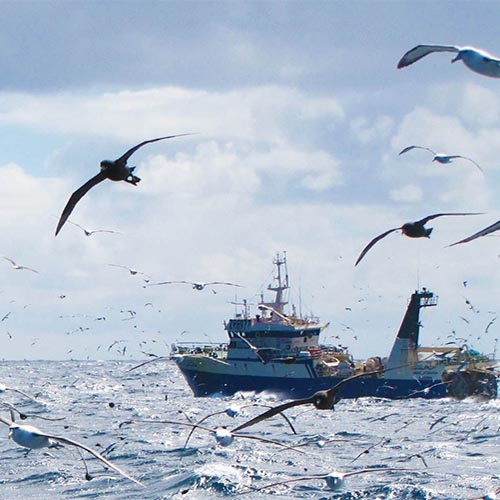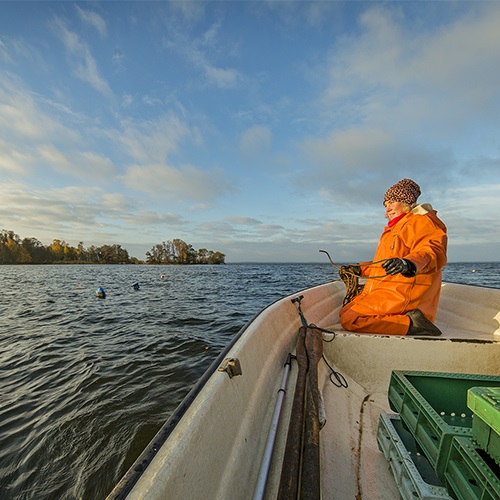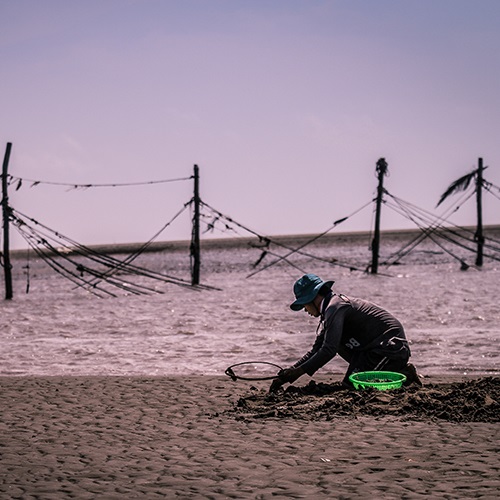Part of our work is to evaluate how well our standards and certification system functions. Do the activities of the MSC program help towards achieving our vision of abundant oceans with seafood supplies safeguarded for the future?
Are we delivering on our Theory of Change?
“Good monitoring and evaluation is needed to verify whether our program is delivering the impacts promised by the MSC label.”
Katie Longo
MSC Senior Scientist
To carry out this this monitoring and evaluation, we have a dedicated team who systematically assess activities and:
- Analyse the environmental and social impacts of MSC certified fisheries
- Provide evidence for decision-making when the MSC revises its Standards
- Communicate the most up-to-date scientific understanding of fish stocks, fisheries management best practice and seafood certification
- Summarise the diverse activities and datasets of the MSC program into a series of indicators that allow us to measure changes over time.
The MSC Monitoring and Evaluation framework
The MSC Monitoring and Evaluation Framework describes the purpose and scope of the M&E program. It contains the indicators used to measure changes and compare progress against targets.
MSC Monitoring and Evaluation framework 2024
| Description: |
An overview of the MSC Monitoring and Evaluation Framework. Version 8.1 |
| Language: |
English |
| Date of issue: |
24 October 2024 |
| Date effective: |
24 October 2024 |
Theory of change graphic
| Description: |
MSC's theory of change describes how the program will contribute to the MSC achieving oceans teeming with life, and seafood supplies safeguarded for future. |
| Date of issue: |
05 September 2019 |
For earlier versions of the M&E framework, please contact the
MSC Research Team.
Monitoring and Evaluation Review
The MSC’s Monitoring and Evaluation (M&E) Stakeholder Review project was conducted between March 2022 and March 2023. Below is a summary of the project findings.
MSC Monitoring and Evaluation Review - Project Summary
| Date of issue: |
06 December 2024 |
Monitoring, Evaluation and Learning technical reports
The technical reports describe a series of indicators representing the Monitoring and Evaluation Framework. These indicators reflect diverse aspects of the MSC program and aid in evaluating whether the MSC is delivering on its
vision, mission, and Theory of Change for the production of sustainable seafood.
MSC Monitoring, Evaluation and Learning Technical Report 2024
| Date of issue: |
20 December 2024 |
MSC Monitoring and Evaluation Technical Report 2022
| Date of issue: |
16 May 2022 |
Monitoring and Evaluation Program background
An earlier version of the MSC Monitoring and Evaluation Framework was developed in 2006 during a multi-stakeholder workshop. It was expanded through a public consultation process in 2011.
MSC Monitoring and Evaluation consultation document
| Description: |
In 2011, the MSC developed its current M&E framework through a consultative process. This document outlines this consultation. |
| Language: |
English |
| Date of issue: |
10 May 2011 |
MSC Monitoring and Evaluation Workshop Report 2006
| Description: |
This report outlines the 2006 workshop in which the MSC's monitoring and evaluation framework was developed. |
| Language: |
English |
| Date of issue: |
20 September 2006 |
Global Impacts Reports
MSC Global Impacts Reports were the precursor to the current Monitoring and Evaluation Technical Reports. These earlier Global Impacts Reports summarised key elements of the MSC program and evaluated impacts of the MSC program.
MSC Global Impacts Update 2019
| Description: |
An updated review of the Marine Stewardship Council program and the improvements made by MSC certified fisheries around the world. |
| Language: |
English |
| Date of issue: |
08 June 2019 |
| Date effective: |
08 June 2019 |
GIR 2019 supplementary methods
| Description: |
An overview of the methodology used to create the 2019 fisheries improving update. |
| Language: |
English |
| Date of issue: |
06 June 2019 |
| Date effective: |
06 June 2019 |
MSC Global Impacts Report 2017
| Description: |
A 20th anniversary review of the Marine Stewardship Council program and the progress and improvements made by MSC certified fisheries around the world. |
| Language: |
English |
| Date of issue: |
01 June 2017 |
MSC Global Impacts Report 2016
| Language: |
English |
| Date of issue: |
30 April 2016 |
MSC Global Impacts Report 2016 appendix and methods
| Description: |
Data used in the 2016 Global Impacts Report |
| Date of issue: |
30 April 2016 |
MSC Global Impacts Report 2015
| Language: |
English |
| Date of issue: |
30 April 2015 |
MSC Global Impacts 2015 Summary
| Description: |
A summary of the 2015 Global Impacts Report |
| Date of issue: |
30 April 2015 |
MSC Global Impacts Report 2014 Summary
| Language: |
English |
| Date of issue: |
30 April 2014 |
MSC Global Impacts Report 2014
| Language: |
English |
| Date of issue: |
30 April 2014 |
Global Impacts Report 2013
| Language: |
English |
| Date of issue: |
30 April 2013 |
Global Impacts Report 2013 Summary
| Description: |
A summary of the 2013 Global Impacts Report |
| Date of issue: |
29 April 2013 |




